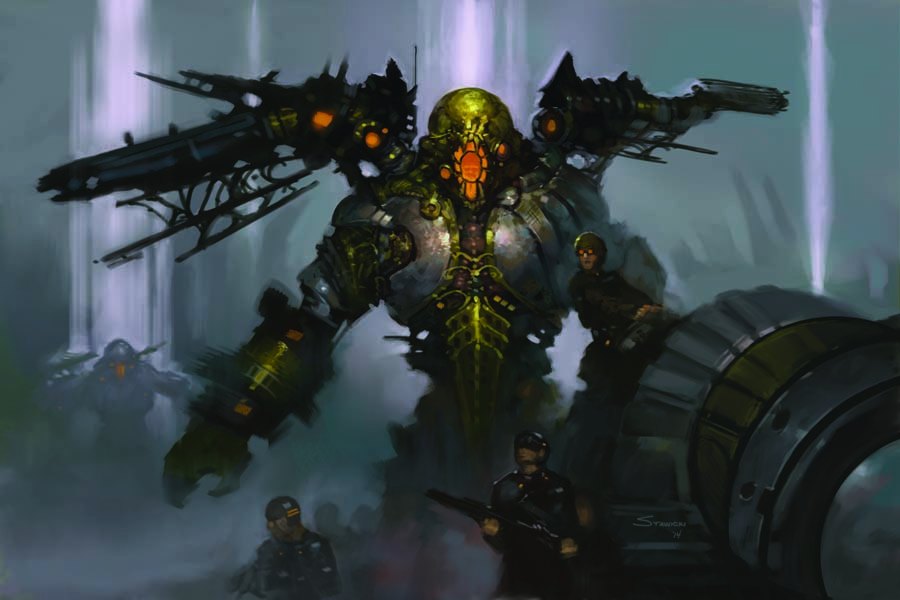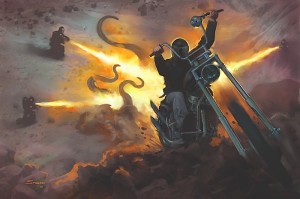This is the eighth in a series of articles introducing The Strange. You can read the first one here.
If you know how to play Numenera, you know how to play The Strange.
The rules of The Strange are quite straightforward at their heart, since all gameplay is based around a few core concepts. The Strange uses a twenty-sided die(d20) to determine the results of most actions.
The game master sets a difficulty for any given task. There are 10 degrees of difficulty. Thus, the difficulty of a task can be rated on a scale of 1 to 10. Each difficulty has a target number associated with it. The target number is always three times the task’s difficulty, so a difficulty 3 task has a target number of 9. To succeed at the task, you must roll the target number or higher.
Character skills, favorable circumstances, or help from allies can decrease the difficulty of a task. For example, if a character is trained in climbing, she turns a difficulty 6 climb into a difficulty 5 climb. If this same trained character also has some particularly excellent climbing gear, she turns a difficulty 6 climb into a difficulty 4 climb. Training is a skill, and good equipment (or other favorable circumstances) is called an asset.
You can also decrease the difficulty of a given task by applying Effort. Effort costs points from a character’s stat Pools to use (so it’s a limited resource). Characters have three stats–Might, Speed, and Intellect, and points for using Effort come from the Pool most appropriate to the task. Effort is the primary way that players have to really influence the course of the game. By using Effort, a Player can really focus on the tasks of particular importance to the character, rather than leaving it all up to a die roll.
Thus, three things can decrease a task’s difficulty: skills, assets, and Effort. If you can decrease a task’s difficulty to 0, you automatically succeed and don’t need to make a roll at all.

COMBAT
Combat works exactly like any other sort of task–an NPC opponent has a level that equates to difficulty, which indicates how hard she is to strike in combat, and how hard it is to avoid her attacks. Skills, assets, and Effort all come into play. In The Strange, players do all the die rolling, so if a PC attacks an NPC, the player makes an attack roll, and if an NPC attacks a PC, the player makes a defense roll.
CYPHERS
Of course, it’s called the Cypher System, so we need to mention cyphers. Cyphers are ever-changing aspects and abilities that your character has access to in the form of items of power. In terms of character capabilities, they are particularly cool abilities that a character can use one time. Cyphers are above and beyond the always-at-the-ready things that you can do thanks to your character type, focus, or descriptor. You can always count on the abilities inherent to your character, and cyphers are wild card powers that are exciting, but fleeting.
Cyphers are items that arise directly from the creative energy inherent within the Strange itself. Because of this fundamental nature, cyphers are the only things that your character can normally take when they translate themselves to another world.

EXPERIENCE POINTS
Experience points (XP) are rewards given to players when the GM intrudes on the story (this is called GM intrusion) with a new and unexpected challenge. For example, in the middle of combat, the GM might inform the player that he drops his weapon. To intrude in this manner, the GM must award the player 2 XP. The rewarded player, in turn, must immediately give one of those XP to another player and justify the gift (perhaps the other player had a good idea, told a funny joke, performed an action that saved a life, and so on).
Alternatively, the player can refuse the GM intrusion. If he does so, he doesn’t get the 2 XP from the GM, and he must also spend 1 XP that he already has. If the player has no XP to spend, he can’t refuse the intrusion.
The GM can also give players XP between sessions as a reward for recovering interesting artifacts or making discoveries during an adventure. You don’t earn XP for killing foes or overcoming standard challenges in the course of play. The Strange is all about exploration, discovery, and creation.
Experience points are used primarily for character advancement, but when in a really tight spot, a player can also spend 1 XP to reroll any die roll and take the better of the two rolls.
This is the eight in a series of posts introducing The Strange. Read the next article, Creatures of the Strange. We’ll post new articles every week throughout June, July, and into August!